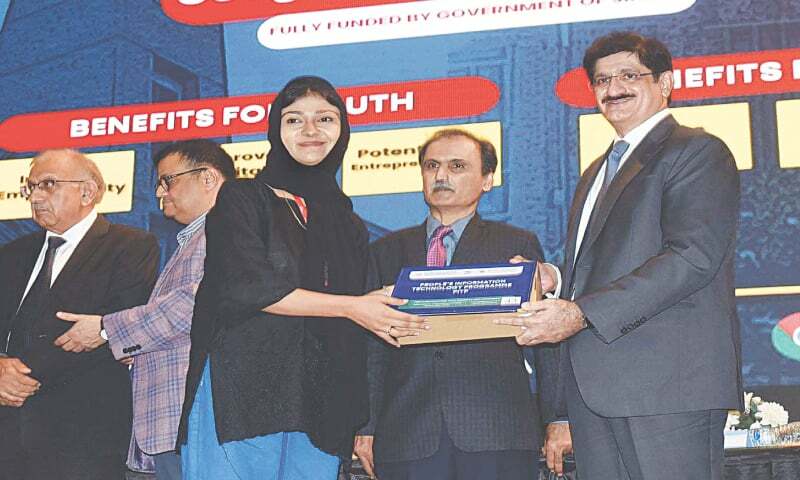• Murad highlights commitment to higher education, digital empowerment
• Inaugurates new buildings at NED University • Distributes Chromebooks among 300 students
• Launches second phase of Peoples Information Technology Programme
KARACHI: Chief Minister Syed Murad Ali Shah said on Friday that the provincial government had allocated a record Rs42 billion for public-sector universities in the current financial year, the highest among all provinces, to support operational needs, research, infrastructure and innovation.
He said this while highlighting Sindh’s commitment to higher education, digital empowerment and youth development through pioneering initiatives such as the Peoples Information Technology Programme-I (PITP-I).
Speaking at the inauguration ceremony of newly constructed buildings at NED University and the distribution of Chromebooks to top-performing PITP-I students, he spoke about the initiative’s success. He shared that 4,365 out of the 13,565 students trained under PITP-I had secured employment, which contributed Rs49 million in direct income to the provincial economy.
The CM reaffirmed the government’s commitment to building an inclusive, digitally empowered and economically resilient Sindh. He described PITP-I as a shining example of what public-sector universities could achieve when trusted and empowered.
PITP-I, a model for digital inclusion, was conducted in partnership with NED University, Mehran University of Engineering & Technology (MUET) and Sukkur IBA.
He added that the 13,565 students trained under PITP-I had exceeded initial targets. “Of these, 4,353 graduates have secured employment, contributing Rs49m in direct income to the provincial economy,” he said.
Mr Shah also appreciated the notable female participation in the programme—40 per cent at Sukkur IBA, 36pc at NED, and 33.6pc at MUET where 62pc of the participants also came from rural backgrounds.
The chief minister distributed 300 Google Chromebooks/laptops to top-performing PITP-I students through a transparent, merit-based selection process tailored to each institution.
He said the Sindh government, in collaboration with Google and Tech Valley Pakistan, has been distributing Chromebooks and launching initiatives to improve digital literacy and IT skills among students. These efforts include the provision of Chromebooks to top performers, Google Career Certificate scholarships and the integration of Google tools into the education system.
Training for Chromebook recipients will be conducted in April by Tech Valley, Google’s partner in Pakistan, followed by award ceremonies in May, where certificates and Chromebooks will be distributed by the chief minister or the minister-in-charge.
The chief minister also formally announced the launch of PITP-II, with an expanded budget of Rs1.4bn.
The next phase aims to train 35,000 students in 12 high-demand IT fields, including matric, intermediate and graduate students (age limit: 28). A total of 1,750 Chromebooks will be awarded to the top five per cent of performers.
PITP-II is expected to generate a 40 per cent employment rate, with an estimated economic impact of up to Rs5.04bn over five years.
The CM praised the leadership of former NED Vice Chancellor Dr Sarosh Lodi, incumbent VC Dr Muhammad Tufail Jokhio, Dr Tauha Hussain Ali and Dr Asif Shaikh, along with PITP focal persons and Tech Valley CEO Mr Umer Farooq.
He also acknowledged the tireless efforts of the science and information technology department, particularly Noor Ahmed Samoo, Dr Shahzeb Malik and Athar Baloch.
At NED University, the chief minister inaugurated two major infrastructure projects: a new building for the department of food engineering, equipped with advanced laboratories and built at a cost of Rs96.48m, and the international boys hostel, which accommodates 112 students and was constructed for Rs67.11m.
Additionally, a dedicated girls’ hostel block for 52 female students, funded at Rs98.52m, was recognised as a step towards promoting gender inclusivity in engineering and technical education.
Published in Dawn, July 19th, 2025
